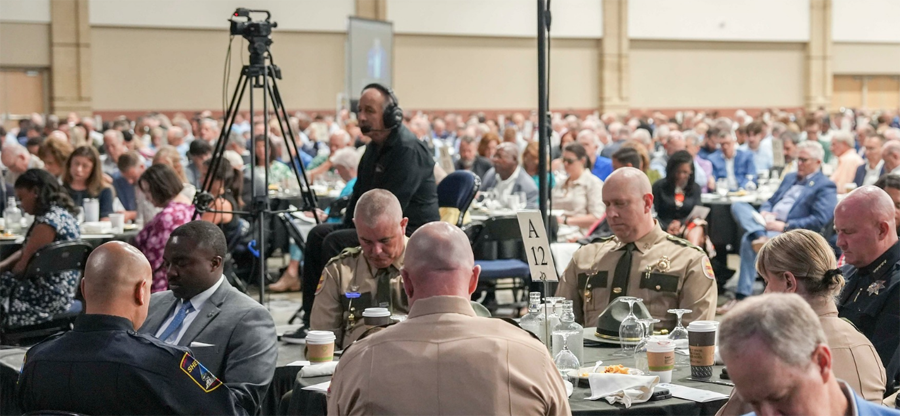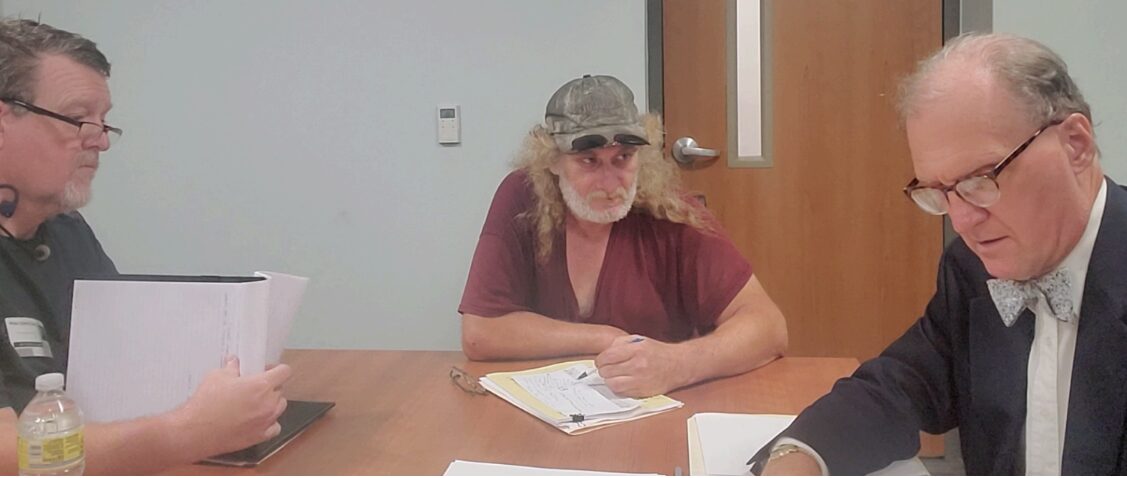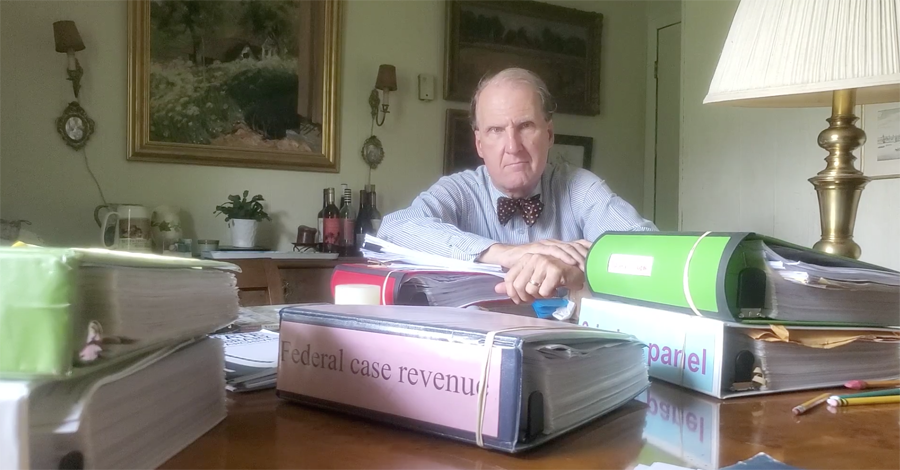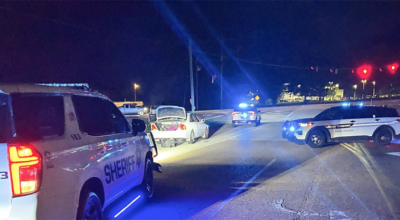
Austin Garret, sheriff of Hamilton County, Tenn., right, attends a prayer breakfast, with head bowed, in Chattanooga. His department enforces the fraud of TFRL under policy of revenue and safety departments that I am asking the courts to halt. (Photo HCSO)

State trooper cadets stand at attention. They are training to impose the commercial trucking law on noncommercial travelers apart from title 65, chapter 15, the carrier code, and they enforce mandatory POFR on all travelers apart from the law. (Photo THP)
CHATTANOOGA, Tenn., Tuesday, Aug. 5m 2025 — With help of those I call “the gnomes,” my petitions for redress of grievance against corrupt officials in Tennessee department of revenue include a detailed demand for relief for fraud under color of Tennessee financial responsibility law of 1977. The fraud began in 2002 with enforcement of sect. 139 under a misreading of law, and ramped up Jan. 1, 2017, with use of EIVS, the “Eye of Sauron,” as I have dubbed it.
The reformation is not just to put filters on the giant surveillance eyeball that is EIVS so it sends inquiry and revocation notices under law. The law imposes duties on two groups only, those people in a qualifying accident and those people who get their driver licenses restored on condition of having insurance. My proposal demands a special monitor or master to bring restoration to the tens of thousands of people falsely convicted by the fraud now run by commissioner David Gerregano in revenue and Jeff Long in safety. These villains knowingly and intentional violate the black letter law. I have been explaining the law for two years to “the Guano,” but his attorney and henchman AHO, or administrative hearing officer, will in no way obey ordinary rules of statutory constructions.
These rules will be their downfall, unless the courts make an “exception,” which they’ve done already on high-profile scandals I have litigated against financial and industrial interests. The exception would have to to approve mass repeal by impication, denial of the rule of reading law in para materia (reading law in context of all its parts), spiking of the rule of ejusdem generis (a general term is controlled by more specific terms in a statute), and acceptance of the idea that certifications are meaningless, of no account, of no value.

From left, gnomes Christopher Sapp, Eagle Radio Network midstate bureau chief, and Ed Soloe, the “gnome librarian” handyman from Alcoa, discuss deposition workarounds with David Tulis, a radio investigative reporter, inside a revenue department conference room during a break in a deposition. (Photo David Tulis)
Relief requested
Petitioner respectfully invokes the court’s jurisdiction under T.C.A. § 4-5-322 to issue orders of relief. The remedies sought address unlawful administrative actions, restore petitioner’s revoked registration and establish guardrails to prevent further violation of the Tennessee financial responsibility law.
These requests are rooted in specific statutes, the constitutional rights of Tennesseans and the need for structural redress in the interest of law and justice.
A. Declaratory relief
Where the legislature intended to impose obligations, it did so clearly. Where it imposed duties, it said who, when, and under what conditions. The department’s program respects none of these boundaries.
Petitioner respectfully invokes the court’s jurisdiction under T.C.A. § 4-5-322 to issue declaratory, injunctive and equitable relief and reimbursement of his costs. The following findings and orders are necessary to remedy unlawful agency action, restore petitioner’s privilege under law and protect the rights of similarly situated Tennesseans.
Petitioner respectfully requires restoration of tag revoked upon unlawful procedure.
To read Part I of this story, click here
Further, petitioner asks the court to, in upholding the law and equity, make findings:
Of fact that the absence of a qualifying accident involving petitioner in his motor vehicle is dispositive of the contested case in favor of his claims. TC.A. § 55-12-104.
Of fact that he is under no order of suspension from DOSHS.
Of law that respondent’s use of EIVS applies not to the noncustomer of the insurance industry, but to the motor vehicle liability policy holder. The only policy required by T.C.A. § 55-12-139 that the deputy or police officer verifies is one certified pursuant to the IICMVA standard for mandatory insurance, namely the SR-22 liability policy, the certificate containing “the necessary information [filed] with the commissioner on a certificate or form approved by the commissioner [of safety],” § 55-12-137, which form is used by revenue, sect. 210(a)(1)(A) and sect. 211(a)(3))A), “The owner or operator’s proof of financial security in a form approved by the department of revenue,” which form is required of those people under privilege suspension that must be kept handy to show the officer as continuing proof of financial responsibility, and which form must be submitted, along with renewal fees, if applicable, “[w]henever a license or registration is suspended or revoked and the filing of proof of financial responsibility is made a prerequisite to reinstatement of the license or registration,” T.C.A. § 55-12-129, and at time for renewal of the license or registration.
Quick take ———————
➤ Safety, revenue must cooperate
➤ Monitor makes sure injured citizens get records cleared
➤ One-time restitution payment for false criminal conviction
Of law-and-fact that in violation of T.C.A. §§ 55-12-139, 55-12-202 and 55-12-210 respondent is administering the statute beyond its scope, that administration violates the command to establish an “efficient insurance verification program,” T.C.A. § 55-12-202, one that “[verifies] whether the financial responsibility requirements of this chapter have been met with a motor vehicle liability insurance policy,” T.C.A. § 55-12-204 (emphasis added), wherein current practice generates false positives among registrants not subject to either TFRL nor Atwood amendment’s EIVS utility, therein adding to department payroll, mail and other overhead costs, while injuring petitioner in his rights, and others in like standing, and that respondent must cease all activity that prevents the program from working efficiently and regularly to prevent the harm to petitioner from occurring upon others.
LAWFUL USE OF EIVS
Further, petitioner respectfully demands the court make findings of law that:
Respondent must forthwith, if not sooner, use EIVS under filter pursuant to T.C.A. T.C.A. § 55-12-202 to alert respondent of people whose policies are motor vehicle liability insurance policies, per T.C.A. § 55-12-122, which policies under TFRL are required to be certified, per T.C.A. § 55-12-102(7), “‘Motor vehicle liability policy’ means an ‘owner’s policy’ or ‘operator’s policy’ of liability insurance, certified as provided in T.C.A. § 55-12-120 or § 55-12-121 as proof of financial responsibility, and issued, except as otherwise provided in T.C.A. § 55-12-121 by an insurance carrier duly licensed or admitted to transact business in this state” (emphasis added), of such parties required under record from DOSHS’ financial responsibility division to carry such auto insurance coverage for conditional use of the driving privilege.
Respondent is obligated, in verifying insurance as POFR, to use “the data elements that the department of revenue *** and automobile liability insurers have agreed upon and are necessary to receive accurate responses from automobile liability insurers” T.C.A. § 55-12-206.
Respondent’s administration of T.C.A. § 55-12-210 must comply with Part 1 of TFRL, delimiting the scope of Part 2, with the four notices served on the owner of a “motor vehicle *** not insured” whose duty and agreement to carry insurance or other POFR is known to the department under certificate and who has violated terms of his suspension by ceasing payment to his “liability insurer of record” and as such is “eligible for notice,” as follows: “(g) If the vehicle is no longer insured by the automobile liability insurer of record and no other insurance company using the IICMVA model indicates coverage after an unknown carrier request under § 55-12-205(3), the owner of the motor vehicle becomes eligible for notice as described in subsections (a) and (b)” T.C.A. § 55-12-210(f).
B. Injunctive relief, corrective action
Department notices under T.C.A. § 55-12-210 are insufficient and misleading and that they be ordered clarified to show that they apply only to suspendees who for reason that need to be stated in particular in personalized notice are required to have certified policies current with their insurance carrier but who do not have such policy, and are thus in jeopardy of losing the driving and operating privilege, contingent on insurance coverage, said notice needing to confirm that the party has failed to show financial responsibility following a judgment, conviction, court order, or DOSHS administrative determination as to the duty to have POFR, to which duty the notice recipient agreed. With court-ordered redaction, respondent is directed to explain in notice how TFRL works from Part 1, explain that Atwood is the enforcement utility, that suspendee under EIVS surveillance is in jeopardy of loss of privilege for a non-current policy, and state the duration of the suspension, giving date of release. T.C.A. § 55-12-114, T.C.A. § 55-12-116 and T.C.A. § 55-12-126.
Notice will make clear that POFR obligation is for no longer than five years, or the duration of the suspension. T.C.A. § 55-12-114. Notice will state that once the suspension ends, the person is released of any and all requirement to maintain that proof of financial security or financial responsibility, the release statement being made IN ALL CAPITAL LETTERS or in bolded letters that the registrant is free to have insurance coverage, or not once suspension is complete as Tennessee is an after-accident voluntary insurance state, as described in case law, the law coercing no one to do business with any company or concern if such person is not under penalty.
INTER-DEPARTMENTAL COOPERATION
DOR consult and cooperate with DOSHS per Atwood law T.C.A. §§ 55-12-103 and -204 and regularly use its financial responsibility division resources to allow EIVS to operate under its DOR certificate. T.C.A. § 55-12-204.
DOR inform DOSHS of its compliance with law and request DOSHS reinstate any driver license suspended or revoked for above said reason, or non-payment of court cost thereof, or give notice to former suspendees regarding their rights and their opportunity to restore their licenses and registrations.
DOR refer to and use the driver record, kept by DOSHS financial responsibility division, to make only that persons with a motor vehicle liability policy on record subject to T.C.A. § 55-12-210 inquiry and revocation notice.
C. Restitution & remediation
Respondent inform DOSHS that, in remediation for wrongdoing, it must release from the requirement of POFR any person who was required to have proof of financial responsibility because that person didn’t have insurance or POFR under the false reading of T.C.A. § 55-12-139.
Since EIVS is to monitor each person with motor vehicle liability policy under T.C.A. § 55-12-122(c), and since respondent sends out 6,000 program-related notices each Monday and 6,000 each Wednesday, mostly in excess of statutory authority, respondent staff and agency contractor i3 Verticals shall begin and complete a process of restoration and restitution for past wrongful notice, based upon random selection of registrants present and former erroneously revoked, in the interest of maintaining quality of public service during the reformation.
Respondent reinstate any registration so suspended or revoked, free of fines or fees, and reimbursement of monies paid for said registration.
D. Public notice and awareness
Department and contract personnel be trained by having familiarity with financial responsibility infrastructure of TFRL Part 1, that all personnel understand the POFR duty is on parties who must prove good behavior in the use of the privilege, whether following qualifying accident or following adjudication of other § title 55 breach of rules of the road.
Notices, videos, memos, class lectures, social media posts, public service announcements and other remediation and correction updates be created by respondent and promulgated to Tennessee highway patrol and law enforcement agencies across the state so that they administer Atwood using EIVS according to law upon those parties required to have insurance or other POFR, those under suspension and conditional use, and no other.
Respondent be required to arrange for publicity, advertising and mass social media communications about respondent’s effort to heal the breach its program has caused among the people of Tennessee, so that they might be on awares about the restitution offered by respondent and state of Tennessee in good faith and in sorrow for wrongdoing.
Such respondent communications with statewide law enforcement agencies must indicate that the motor vehicle of the POFR-liable person is subject to towing only if there is a local ordinance or provision allowing that to be done. T.C.A. § 139(c)(4).
E. Court-appointed monitor
Court create an office of monitor or special master to assist the court in overseeing compliance with its orders.
This office, the authority of which is time limited and report bound, will serve the court and oversee reformation of the financial responsibility section of the department, which party will give notice to the county clerk and courts in Hamilton County, where petitioner lives, that its past enforcement of TFRL is constitutionally impermissible, and without authority, and likewise in all other municipalities statewide, and that the office of monitor deal with a court record notification process serving citizens in all counties and oversee concessions state of Tennessee makes to people falsely criminally charged and convicted, either by jury, bench trial or by plea bargain in overthrow of the peace and tranquility of the state and the people.
Department be commanded to submit to this monitor, and his/her office and staff, to heal the breach between petitioner in Hamilton County and the balance of people in the state’s other 94 counties that the honor and dignity of falsely convicted Tennesseans be restored, that civil records be corrected, as equity and justice might require, and public confidence in respondent department might be restored.
COMPENSATION PAYMENT PROGRAM
The monitor consult with the commissioner, the commissioner of safety, the speakers of the state house and senate, the governor’s office, the state comptroller, the attorney general’s office and others as to a protocol for Tennesseans to follow in making application for redress, in the form of an equitable one-time payment or other just compensation for distress, harm, false report, inconvenience, humiliation respondent has caused, using authority lawlessly imposed, in use of police power exercise by LEAs in every county.
UPDATE FOR PROSECUTION RULES
Respondent issue a public statement regarding T.C.A. § 139, used as basis in every criminal prosecution, “that the 2003 Attorney general opinion on TFRL concerns only instances when insurance is used as proof of financial responsibility and T.C.A. § 55-12-139 does not require proof of financial responsibility of anyone not under duty by the department of safety and homeland security to provide proof of financial responsibility because of an earlier accident or judgment.” Such publicity will provide a contact for any person convicted under and aggrieved by former policy under T.C.A. § 55-12-139.
DRIVER LICENSE APPLICATION UPDATE
Respondent, in cooperation with DOSHS, revise the statement required of applicants of driver licenses pursuant to T.C.A. § 55-12-138, certificates and certification, that says the TFRL summary “shall contain the following or similar certification to be signed by the applicant” (emphasis added). The update shall state: “I certify that I understand that if I am involved in a qualifying accident under the Tennessee financial responsibility law of 1977, or that if my license is suspended for cause after adjudication and I seek conditional use of the privilege, I agree I will abide by said law.”
Further, petitioner respectfully requests that —
The general assembly be consulted as to funding for this program of notice, reparation, restitution and healing, as to advertising, media outreach and compensation or reimbursement for damaged men and women among the “free people” of Tennessee, as they are called in Tenn. Const. art 1 § 24.
The department and court monitor petition the general assembly, as necessary, for accelerated means to allow for free, easy-to-obtain expungement of any record connected with a registration tag or plate revocation or suspension under the former policy, and that court charges that are fruit of criminal charges stemming from a tag revoked by respondent be sought, tallied, separated and expunged en masse and in toto, with fines and fees paid fully reimbursed.

My three court cases to overthrow the “Eye of Sauron.” (Photo David Tulis)
F. Petitioner-specific relief
In light of the court’s finding of law and fact in this appeal, that petitioner’s motor vehicle registration be restored upon payment of the annual fee, starting the day of the court’s final order, as the registration expired July 2023, with the commencement date of the one-year period of privilege being the date of the order; and that a roughly $3 unpaid balance be prorated out of the amount of privilege tax due for use of that automobile as a motor vehicle for privilege taxable activity.
Respondent on receipt of affidavit of petitioner’s billable hours and ordinary litigation expenses in (1) the contested case in agency, and (2) in this case pay his reasonable attorney fee and other reasonable costs.
These remedies aim not merely to vindicate petitioner’s rights, but to restore coherence to the law, integrity to administrative process and trust among the people in the constitutional limitations of their state government.
Petitioner respectfully requests the above and any further relief as the court may deem just, proper or equitable.
David runs a personal nonprofit fighting and mercy ministry. He thanks you for checks sent directly to c/o 10520 Brickhill Lane, Soddy-Daisy, TN 37379. Also at GiveSendGo.

